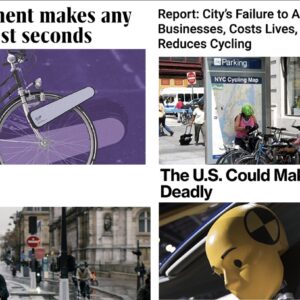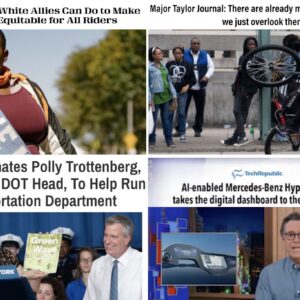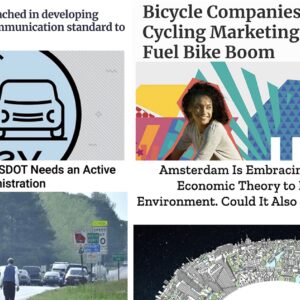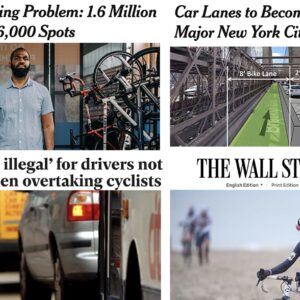Here’s the news that caught our eye this week:
– With the Olympics ending, the Vancouver mayor is hoping to keep some of the magic going—including the transportation measures that boosted foot and bike traffic, created a streetcar, and reduced downtown car traffic by thirty percent.
– A round of major federal transportation infrastructure grants were awarded nationwide, with rail (including freight) and mass transit being the primary focus.
– During the Toyota recall hearings, Secretary of Transportation Ray LaHood stated that lowering speed limits wouldn’t save lives; here’s the fact check.
– Don’t worry, the CEOs of auto companies bailed out by taxpayers are still making the millions to which they are accustomed.
– In Portland, citizen group the City Club has issued a stern report on the area’s transportation system, and recommends that it be overseen centrally by the Metro regional government.
– Cycling deaths are on the decline in the UK. Meanwhile, a dad drives behind his kid as he walks to school, and children get driving lessons.
– Bike-sharing’s latest frontier is a suburb of Mumbai, India, where a private business has opened up a series of hubs. This video shows how it works, and also gives you a look into India’s urban transportation mix.
– Illinois is scaling back their free rides for seniors program.
– Amtrak is now offering free wireless internet on its fast Acela trains between Boston and DC.
– How do you get more women on bikes? Paid maternity leave, says one blogger.
– The new mayor of Houston has proposed making the city’s transit service free for riders, comparing mobility to free public education.
– The Maryland legislature is considering a bill to use the word “crash” instead of “accident” in the state’s traffic laws.
– Yes, it’s true—the Hummer will soon be a collector’s item.
– Back in 1920, the head of the Los Angeles traffic police had an innovative idea for increasing traffic safety on the roads: Ban women from driving. Here’s the scoop, including some interesting historical traffic stats.





I know you probably can’t control the ads, but found it interesting that right under your Toyota recall write-up was an ad for Toyota Rav4.
re: free mass transit – the payroll tax that funds TriMet is failing. we need a new way to pay for mass transit, the increased use of which reduces the need to pump public monies into roads, etc. this would be a great opportunity to restructure funding to make riding fare-less & encourage use (free TM? or pay for gas & parking? hm, which makes more sense today?)
obviously easier to state than do, but if Houston mayor willing to look at this, so should Oregon
Went to the NWTA swap meet at ten Sunday. Line was all the way to corner before they opened the door. The wonderful smell from Franz bakery was delicious, raisin and cinamon. Great buys, fork and chain tensioner. I guess one explains the other. Great vendors, good prices polite buyers and the free donuts were scrumptious.
Hm. Sec LaHood says that the speed limits are “minimum speed limits”.
I always thought (and was taught) that speed limits are the maximum allowed for a particular roadway in perfect conditions?
Or, because he was talking about interstates, does that mean that when it says 65, that’s the minimum I should be going and that I won’t get a ticket for going fast than that?
t.a. barnhart, maybe the TriMet tax is failing because it is set as such a ridiculously low rate.
In 2008 the rate was 0.6618% (gross wages times .006618).
In 2009 the rate was .6718%.
In 2010 the rate is .6818%.
So for every $1000 in wages, an employer pays $6.82 in TriMet tax in 2010.
No wonder it doesn’t fund TriMet to the degree it needs to.
Rust in Peace Hummer
Stretch your highway dollars by fully funding free public transportation. There would be less sympathy for bad drivers in court – more likely to lose their license. Safer, more clear roads by removing bad drivers. Houston may be realizing that there isn’t enough room to increase road capacity by expanding lane volume. If the public agrees to this public transit proposal and it does work to visibly decrease road demand perhaps it’ll enter the public consciousness that life can exist without a car.
One can hope.
Rezone every square foot of parking space in the Metro area as specifically “PARKING”. This would need to include on street parking.
Then tax it sufficiently to fund free public transit. Unexpected side effect: as parking lots decrease in size and number that land can be rezoned to allow more dense development and more tax roll collection from the same area.
I love the idea about changing “accident” to “crash”. I wish that we’d get that here.
Rezone every square foot of parking space in the Metro area as specifically “PARKING”.
Then every time someone wanted to re-develop a parking lot, it would require a zoning change. That’s a pretty cumbersome process (requires City Council approval) and as such would serve as a big disincentive to re-develop parking lots.
We will have to watch Houston and see if they can pull this off.
I doubt that either TRIMET nor CTRAN would give a minute of time to consider ‘free’ public transit service…primarily due to their interest in using a fare as a way to exclude service by those not traveling but instead staying dry or warm/ cool, etc.
The other reason is to throttle back ridership so as to not overwhelm existing/ planned service capacity … so the quality of the ride is protected. (A bit perverse for the short term – but true.)
And more recently…just look at the new ‘Fairless Square’ in Portland.
For buses the cost savings in service speed – by not having to collect fares and repair ticket machines – might go far in covering fare revenue.
I remember back 10 years when CTRAN made more money on interest of its investments vs. farebox revenue. (This is no longer the case now – less money in the bank and higher fares and farebox recovery.)
Hm. Sec LaHood says that the speed limits are “minimum speed limits”.
What LaHodd is saying is that most freeways DO have minimum speed limits (usually around 35MPH). He is not saying that 65 is a minimum limit.
My problem with lowering speed limits is that they are largely irrelevant. Drivers consistently drive the speed that the road they are on ‘dictates’. If you put drivers on a 4 lane road that is straight they are going to go faster than on a curvy 2 lane road (look at Foster and Powell as examples). If those roads had 25mph limits I guarantee that everyone would be speeding.
At the end of the day, cars DO need to move. Purposeful grid lock is NOT a good or viable solution for any city. Speed limits and road planning are complicated. That we all ride bikes does not mean that it’s ok to grind all other traffic to a halt. As always, the solution is in the middle. There should be safe wide roads for bikes and wide roads that allow cars and trucks into our city on safe roads that allow them to travel at a ‘reasonable’ speed (ie one that matches the sort of road they are on).
Kt…what do you think the rate should be? Or should the money be obtained from another source?
So, currently, for employees being paid $10,000…a starving wage really…employer pays $68 bucks for the tax; 10 employees, $680 bucks. If not this, what amount should employers be paying for the benefit mass transit provides their business and the community?
“…Megan McArdle at the Atlantic, writing on today’s Toyota hearing in the House oversight committee, hears Transportation Secretary Ray LaHood claim that “lowering the speed limit to 30 mph would not save any lives, which is why we have minimum speeds on highways.” …” DC Streetsblog/Elana Schor
No points from me on the reporting and writing of that streetsblog story. It, nor LaHood’s quote makes any sense. Maybe it was taken out of context.
It’s amazing to me to hear people supporting high speeds on the freeway. 65-70mph? Okay. 85mph..even better…safer even according to…I think it was comment #5 on the streetsblog story.
Seriously…considering the incompetence of many motor vehicle operators known to be on the road, can we really believe it’s safe for these people to be driving at very high speeds (which I happen to think 85mph definitely is)?
There’s a minimum speed limit on highways because there is a maximum speed limit.
You can’t have a 65mph limited access highway with people driving 30mph. They become a hazard and add to the number of crashes because of the difference in speeds.
That does not mean that lowering the speed limit to 30 wouldn’t reduce fatalities.
If everyone were driving 30 on that limited access highway, the number of fatalities would drop because the severity of the crashes would be less.
The Transportation Secretary is playing fast and loose with the reason for minimum speed limits on highways.
kt, #4 –
Highways have mostly unposted minimum speed limits (though I remember some posted ones in Ohio, Min 45 Max 65, etc.) along with language in the law that refers to impeding the flow of traffic. So yeah, you can get pulled over for going too slow on the highway.
Glad to see Hummer go, what a waste of resources a single vehicle can be. Let’s be honest though, usable electric vehicles will be around before fossil fuels are depleted; the car is never going away. Maybe along the way though, we can find something to do about the entitlement many feel they have to driving – an education of sorts. Maybe instead of concentrating on speed limits, we should require auto manufacturers to build them into the vehicles themselves. Don’t need to post a sign if your car can’t physically exceed 75 mph. Bet it would help save on overall energy consumption, as well.
I understand that there are unsigned minimum speeds on freeways– but the thing is, they aren’t explicitly made known to the general populace (read: people who don’t spend time reading up on the laws). All the speed limit signs I’ve seen around Oregon and Washington are Maximum speed limit signs.
I do recall seeing some “min/max” signs in Hawaii…
I guess I didn’t really think about it in-depth.
Anyway: people are going to drive whatever speed they feel comfortable driving; that’s why so many people speed in school zones or in 25-35mph zones– because they are comfortable going 40mph down that particular piece of road and as such don’t pay attention to their actual rate of speed until they come upon other people going slower.
Re: Hummer going away: aw…. so sad (not). But hey, you can still get a Cadillac Escalade that’s about as big and economical as a Hummer…
Re: Tri Met tax: It’s frustrating that the tax is set at two-thirds of a percent of gross wages and then you hear that TriMet is getting rid of routes or restricting the existing routes or otherwise trying to figure out a way to generate funds. Why have a tax that contributes such a small amount if it doesn’t help? Get rid of it.
Caveat: I’ve been working in payroll for 10 years now, and the rate has pretty much been around the same since I started preparing quarterly reports. Looking back to 2003, the rate was .6218%. It’s .6818% now. In 7 years, they’ve only increased it .06%– and in some of those 7 years, it didn’t change at all.
“… You can’t have a 65mph limited access highway with people driving 30mph. They become a hazard and add to the number of crashes because of the difference in speeds. …” Anonymous #14
Thanks for offering that interpretation. Sure, confining vehicle highway speed to a compatible range is intelligent. That’s different than claimintg as some people commenting seem to be, that 75 and 85 mph on the highway is safer than 55 or less.
Those making this argument seem to fail to draw a distinction between the abilities required to drive on a racetrack with those required to drive on public roads. Many people of driving age, young and old, with licenses just simply do not have the vision and reflexes to be operating a vehicle at very high speeds on public roads.
#9 … to re-develop a parking lot, it would require a zoning change …
and
#16 Why have a tax that contributes such a small amount if it doesn’t help? Get rid of it.
What I’m suggesting is that owners of parking facilities should pay for public transit through higher property taxes on the area zoned as parking. Over time businesses will find that it is cheaper to give their employees free transit passes rather than pay for acres of un-usable land that costs.
Public parking is a defacto public transit system: direct costs for fuel and operation are deferred to the public but everyone pays for roads, enforcement, environmental clean up and lost tax revenue to real estate that is an asphalt dead zone.
Funding public transit from parking fees is like funding smoking cessation from a cigarette tax: the funding will go away eventually. Ultimately, funding for public transit will need to come from the same sources as police and EMS funding because it is a public service that increases the health and safety of the entire public. By allowing large stretches of cheap parking we encourage people out of public transit.